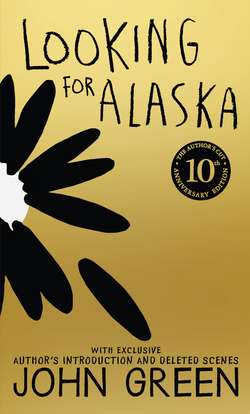Читать книгу Looking For Alaska - John Green, John Green, John (Author) Green - Страница 8
one hundred thirty-six days before
ОглавлениеTHE WEEK BEFORE I left my family and Florida and the rest of my minor life to go to boarding school in Alabama, my mother insisted on throwing me a going-away party. To say that I had low expectations would be to underestimate the matter dramatically. Although I was more or less forced to invite all my “school friends,” i.e., the ragtag bunch of drama people and English geeks I sat with by social necessity in the cavernous cafeteria of my public school, I knew they wouldn’t come. Still, my mother persevered, awash in the delusion that I had kept my popularity secret from her all these years. She cooked a small mountain of artichoke dip. She festooned our living room in green and yellow streamers, the colors of my new school. She bought two dozen champagne poppers and placed them around the edge of our coffee table.
And when that final Friday came, when my packing was mostly done, she sat with my dad and me on the living-room couch at 4:56 P.M. and patiently awaited the arrival of the Good-bye to Miles Cavalry. Said cavalry consisted of exactly two people: Marie Lawson, a tiny blonde with rectangular glasses, and her chunky (to put it charitably) boyfriend, Will.
“Hey, Miles,” Marie said as she sat down.
“Hey,” I said.
“How was your summer?” Will asked.
“Okay. Yours?”
“Good. We did Jesus Christ Superstar. I helped with the sets. Marie did lights,” said Will.
“That’s cool.” I nodded knowingly, and that about exhausted our conversational topics. I might have asked a question about Jesus Christ Superstar, except that 1. I didn’t know what it was, and 2. I didn’t care to learn, and 3. I never really excelled at small talk. My mom, however, can talk small for hours, and so she extended the awkwardness by asking them about their rehearsal schedule, and how the show had gone, and whether it was a success.
“I guess it was,” Marie said. “A lot of people came, I guess.” Marie was the sort of person to guess a lot.
Finally, Will said, “Well, we just dropped by to say good-bye. I’ve got to get Marie home by six. Have fun at boarding school, Miles.”
“Thanks,” I answered, relieved. The only thing worse than having a party that no one attends is having a party attended only by two vastly, deeply uninteresting people.
They left, and so I sat with my parents and stared at the blank TV and wanted to turn it on but knew I shouldn’t. I could feel them both looking at me, waiting for me to burst into tears or something, as if I hadn’t known all along that it would go precisely like this. But I had known. I could feel their pity as they scooped artichoke dip with chips intended for my imaginary friends, but they needed pity more than I did: I wasn’t disappointed. My expectations had been met.
“Is this why you want to leave, Miles?” Mom asked.
I mulled it over for a moment, careful not to look at her. “Uh, no,” I said.
“Well, why then?” she asked. This was not the first time she had posed the question. Mom was not particularly keen on letting me go to boarding school and had made no secret of it.
“Because of me?” my dad asked. He had attended Culver Creek, the same boarding school to which I was headed, as had both of his brothers and all of their kids. I think he liked the idea of me following in his footsteps. My uncles had told me stories about how famous my dad had been on campus for having simultaneously raised hell and aced all his classes. That sounded like a better life than the one I had in Florida. But no, it wasn’t because of Dad. Not exactly.
“Hold on,” I said. I went into Dad’s study and found his biography of François Rabelais. I liked reading biographies of writers, even if (as was the case with Monsieur Rabelais), I’d never read any of their actual writing. I flipped to the back and found the highlighted quote (“NEVER USE A HIGHLIGHTER IN MY BOOKS,” my dad had told me a thousand times. But how else are you supposed to find what you’re looking for?).
“So this guy,” I said, standing in the doorway of the living room. “François Rabelais. He was this poet. And his last words were ‘I go to seek a Great Perhaps.’ That’s why I’m going. So I don’t have to wait until I die to start seeking a Great Perhaps.”
And that quieted them. I was after a Great Perhaps, and they knew as well as I did that I wasn’t going to find it with the likes of Will and Marie. I sat back down on the couch, between my mom and my dad, and my dad put his arm around me, and we stayed there like that, quiet on the couch together, for a long time, until it seemed okay to turn on the TV, and then we ate artichoke dip for dinner and watched the History Channel, and as going-away parties go, it certainly could have been worse.
